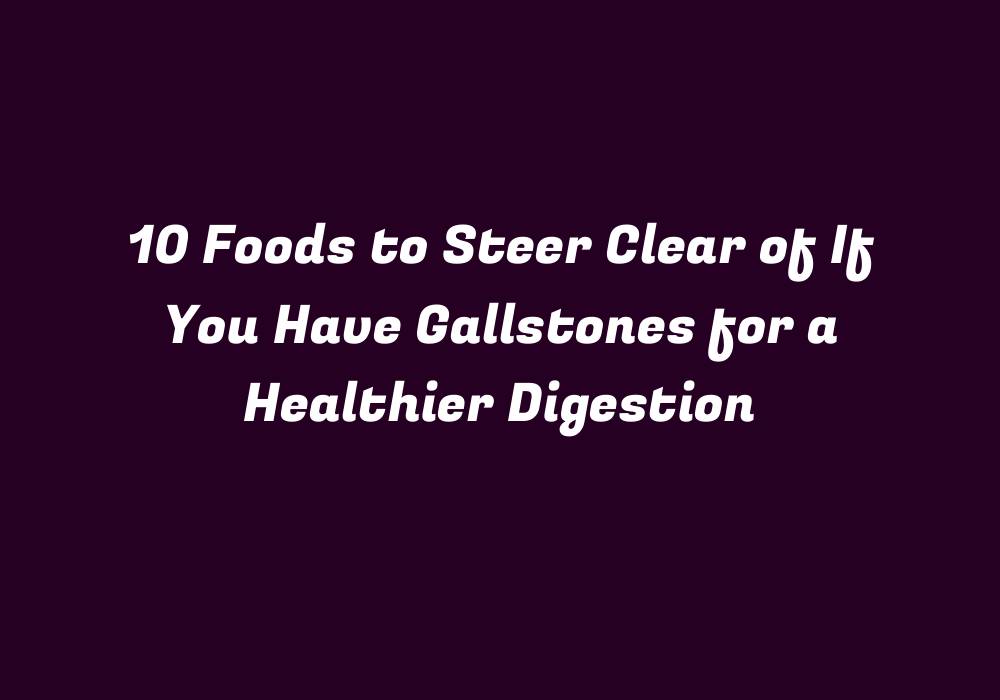10 Foods to Avoid for a Healthier Digestion if You Have Gallstones
Introduction: Gallstones are small, hardened deposits that form in the gallbladder, which is an organ that plays a critical role in your digestive system. It produces bile, a fluid essential for breaking down fats in food. When these stones develop, they can obstruct the flow of bile, causing symptoms like stomach pain, nausea, and vomiting. To ensure a healthier digestion, it’s important to know which foods to avoid if you have gallstones.
1. Fatty Meats
Fatty meats, particularly red meats, can be tough on your gallbladder as they contain high levels of saturated fats. These fats are difficult for the body to process and require more bile to break them down. Consuming excessive amounts of these meats may lead to inflammation in the gallbladder or increase the risk of gallstone formation. Instead, choose leaner protein sources like white meat chicken, fish, beans, and legumes.
2. Fried Foods
Deep-fried foods contain a high amount of saturated fats, which are known to exacerbate gallbladder issues. The process of deep-frying also introduces extra oil into the food that can further burden your digestive system and worsen your gallstone symptoms. Replace fried foods with healthier alternatives like grilled, baked, or steamed dishes to promote a smoother digestion.
3. Dairy Products
Dairy products like milk, cheese, and yogurt can be difficult for some people to process due to the high levels of cholesterol they contain. Consuming excessive amounts of dairy products may contribute to an increase in gallstone formation or worsen existing symptoms. However, it’s important to note that not everyone with gallstones has trouble digesting dairy. If you experience any discomfort after consuming dairy products, consider reducing your intake or switching to lactose-free alternatives.
4. Refined Carbohydrates
Refined carbohydrates like white bread, pasta, and white rice have a higher glycemic index which means they cause rapid spikes in blood sugar levels. These sudden changes in blood sugar can affect the function of your gallbladder by causing inflammation or worsening an already existing gallbladder condition. Opt for healthier whole-grain carbohydrate options to maintain a stable blood sugar level and support digestion.
5. Sugary Drinks
Soda, juice, and sweetened beverages are typically high in sugar and can cause your gallbladder to work overtime to produce sufficient bile for proper fat digestion. Excessive consumption of sugary drinks may lead to weight gain, which can increase the risk of developing gallstones or worsening existing symptoms. Stick to water, tea, or unsweetened beverages to avoid this issue and promote a healthy digestive system.
6. High-Fat Dressings and Condiments
Salad dressings, mayonnaise, and other high-fat condiments can contribute to an unhealthy gallbladder by introducing excessive amounts of saturated fats into the diet. These fats can be difficult for your body to process and may lead to increased bile production or worsening of pre-existing gallstone symptoms. Replace these condiments with healthier alternatives like low-fat dressing options, vinegar, and herb-based marinades.
7. Processed Foods
Processed foods are often high in saturated fats, sugar, and sodium, which can have detrimental effects on the gallbladder. These foods are usually low in dietary fiber, vitamins, and minerals, making them less filling and more likely to contribute to weight gain or other digestive issues. Opt for whole foods like fresh fruits, vegetables, lean proteins, and whole grains as they provide a well-rounded nutritional profile without putting undue stress on the gallbladder.
8. Trans Fats
Trans fats are a type of fat that is created artificially through a process called hydrogenation. These fats are found in many processed and packaged foods, as well as some baked goods and fast food options. Consuming excessive amounts of trans fats can lead to weight gain, inflammation, and increased gallbladder stress due to their negative impact on overall health. Avoid trans fats by reading nutrition labels carefully and choosing items with minimal or no added trans fats.
9. High-Fructose Corn Syrup
High-fructose corn syrup is a type of sweetener often used in processed foods, beverages, and snacks. This ingredient can have detrimental effects on the gallbladder due to its high fructose content which may contribute to gallstone formation or exacerbate existing symptoms. Reducing your consumption of high-fructose corn syrup by avoiding processed foods and opting for natural sweeteners like honey, stevia, or agave can help improve your digestion and support a healthier gallbladder.
10. Alcohol
While moderate alcohol consumption may not be directly harmful to the gallbladder, it does affect the liver’s ability to produce bile. This can cause an increase in cholesterol levels and make gallstone formation more likely. Avoid excessive alcohol consumption and maintain a healthy relationship with your drinks to promote a better digestive system and overall health.
Conclusion: Achieving a healthier digestion if you have gallstones requires careful attention to the types of food you consume daily. By avoiding fatty meats, fried foods, dairy products, refined carbohydrates, sugary drinks, high-fat dressings and condiments, processed foods with trans fats or high-fructose corn syrup, and alcoholic beverages, you can significantly reduce the risk of gallstone formation and improve your overall well-being.
